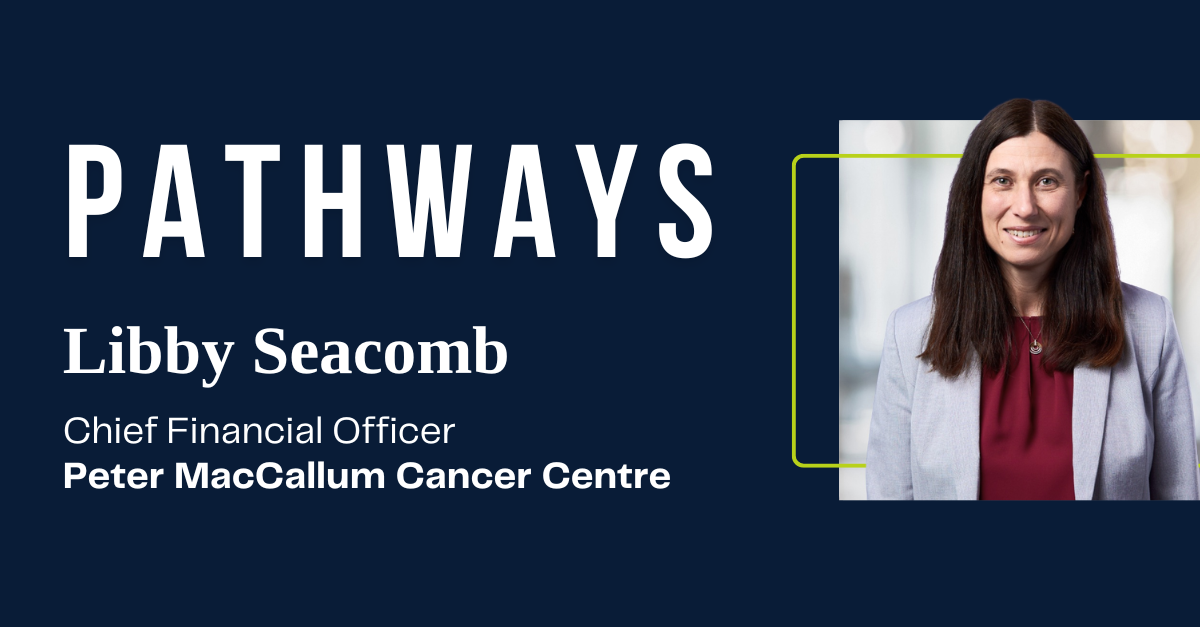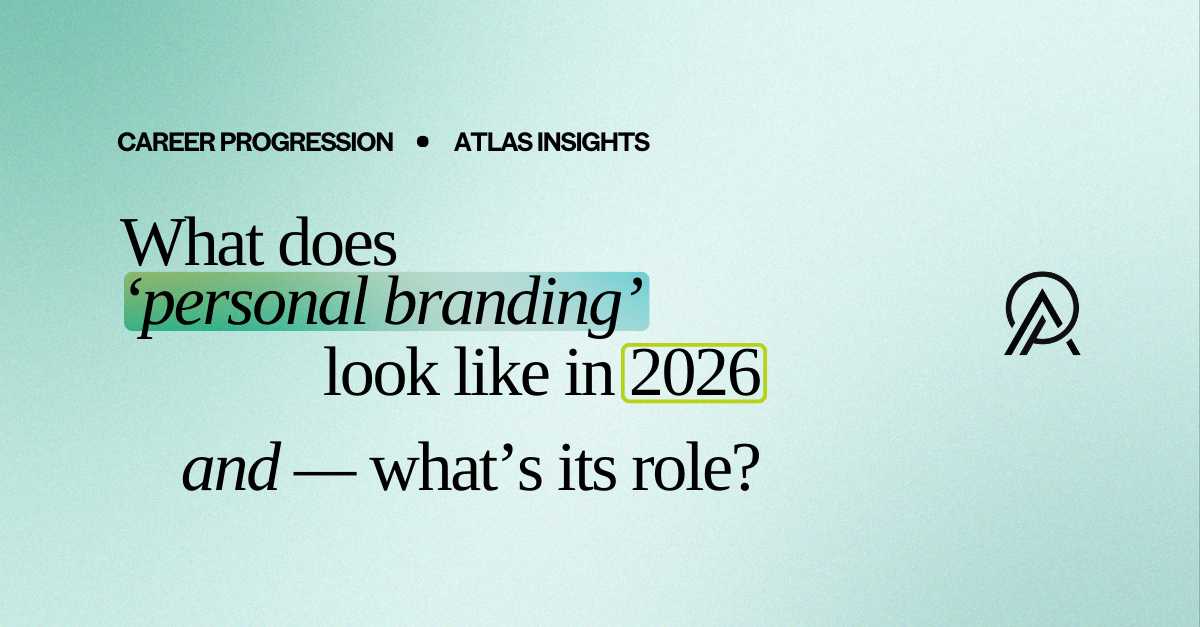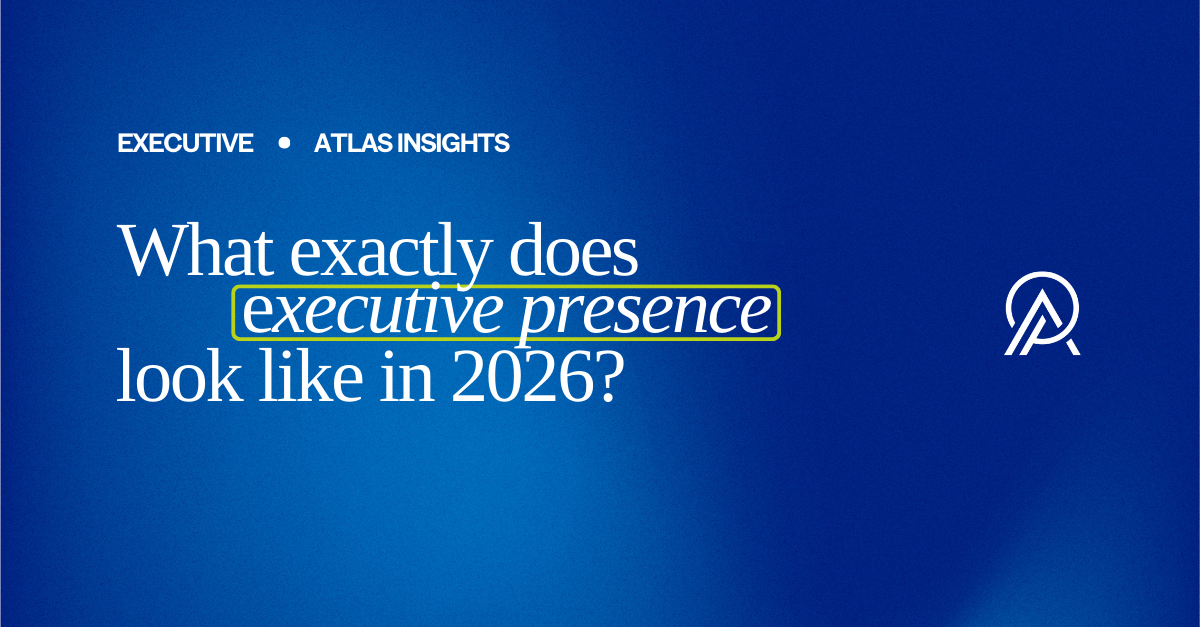
From medical laboratories to the executive suite, Libby Secomb’s career journey is anything but conventional. Now CFO for Peter MacCallum Cancer Centre, Libby brings a rare blend of clinical insight and financial acumen to one of Australia’s leading cancer research and treatment institutions. She joined Atlas Director, Craig Gorton, for our Pathways Podcast to talk about navigating career pivots, overcoming imposter syndrome, and what it takes to lead with purpose in a financially constrained and deeply human sector like healthcare.
Craig
Hello and welcome to our Atlas Partners Pathways programme. Today, we’re joined by Libby Secomb, who is the CFO of Peter MacCallum Cancer Centre. Welcome, Libby.
Libby
Thanks, Craig. Thanks for having me.
Craig
No problem. Let’s jump in. I’d love to hear a bit about your career journey to date. Can you tell us about this, particularly the early days? What were some of the foundational lessons you learned that you still use today?
Libby
My career has been a bit varied. I started not in finance but as a medical laboratory scientist. That was my degree when I graduated from university, and I was fortunate to land my first full-time role at the Royal Children’s Hospital. I joined at a time when the industry was going through a fair bit of turmoil. There was a lot of change happening. The industry, which had previously been a Monday-to-Friday, 9-to-5 operation, was moving towards 24/7 laboratories. This meant rotating shifts—afternoons, nights, and weekends. It was quite a fundamental change, especially for people who had been in the industry for a long time.
I joined quite young, straight out of university, so the change didn’t really worry me. But after a while, I started listening to the people I worked with—predominantly family-oriented individuals with children. They were having trouble managing their lives with the new shift patterns. There was also a lot of hierarchy being removed, which meant fewer opportunities for career progression. You could no longer move from level one to level two, to level three, for example. That really made me question what my future might look like. Where could I grow and develop?
I reconnected with a friend who had worked part-time with me in the laboratory space. She had gone back to university to do a postgrad in accounting, hoping it would help her in the industry. I thought that sounded like a good idea. At the time, I thought I’d use the qualification to try and move into managerial roles in medical labs, but as I thought more about it, I figured I’d pursue the postgrad in finance and accounting myself. I enrolled while working full-time at the Children’s and really enjoyed it—probably more than I thought I would. I didn’t study finance in high school, so it was all new to me. But I really enjoyed the process.
I completed the postgrad after a few years, and then I had to make a decision. A lot of people I studied with were considering working directly in accounting and finance to get experience. I had the choice to either stay at the Children’s with my qualification and hope an opportunity would arise, or try for a graduate position at a chartered accounting firm.
I felt like I was a bit older than the typical graduate, so I wasn’t sure about jumping into that world. But I also knew I wasn’t “old,” so I thought I’d give it a go. In the end, I made the difficult decision to leave the Children’s and was fortunate enough to land a graduate accounting role at PwC. It was a fantastic organisation for learning and development. It really allowed me to understand the finer details of finance and accounting.
I was there for about 18 months and felt I had gained solid foundations. Then, a friend from university reached out to me. She worked in HR for a financial services company who were looking for their first qualified accountant to support the CFO. At first, I was hesitant—I hadn’t been at PwC for two years yet, and there was this sense I needed to “tick the box” in terms of tenure. But she was persuasive, and I agreed to meet with the CFO. It turned out to be a great conversation. They were a fast-growing company with real opportunities for personal growth, so I took the plunge and moved to Liberty Financial.
Liberty was a fast-growing company in the financial services space, not quite a bank, but a lender. They had one mortgage product in Australia, but they were very innovative. The culture was great, with a similar age cohort to mine, so it was a social and supportive environment. I was able to contribute to all the developments happening, and every day was different. It was a great opportunity to learn and grow.
Time flies, and after 16 years, I found myself still there, heading up the finance team. But by then, I was thinking, “What’s next?” The next logical step was to become CFO, but there was a significant gap in terms of skills and experience. There wasn’t another role closer to that, so I started thinking about what to do next. One Friday afternoon, while I was waiting for the coffee machine, I happened to flick through the Financial Review and saw an advertisement for the CFO position at the Royal Children’s Hospital.
That was a bit of an “aha” moment. I’d worked at the Children’s before, but in a very different capacity. The idea of returning as CFO and bringing my finance skills to the organisation really appealed to me. I hadn’t thought about it before, but I decided to apply. Writing my resume after 17 years was quite a mental challenge, and I almost quit a few times during the process. But I knew I’d kick myself if I didn’t try, so I persevered and applied.
Unfortunately, I was unsuccessful, but I was completely fine with that. The process gave me a lot of insight into what I still needed to learn, and it sparked the idea that it might be time to look for something more aligned with a for-purpose organisation. I also figured out where I needed to improve and started focusing on those areas. While I didn’t get feedback from the interview, I knew which boxes I hadn’t ticked.
A few months later, a recruiter contacted me via LinkedIn. ME Bank was looking for a General Manager of Finance, a newly created role. They had gone through some restructuring, and the role included property, procurement, and risk management—areas I didn’t have much experience in. So I applied and was fortunate enough to get the role. This was a great opportunity to get more exposure to the C-suite, the Audit Committee, and the Finance Committee. It was a good stepping stone before reaching the CFO level.
ME Bank started having conversations around the bank being sold. It was at this point I decided to start exploring roles in the medical space again. I applied for a role at a Medical Research Institute, got down to the final two candidates, but was unsuccessful. However, the recruitment firm provided me with valuable feedback, and it was clear I was very close. That gave me the confidence to keep going, knowing that someone just needed to take a chance on me in my first CFO role. It’s a bit of a leap of faith for a CEO to make that decision, but I was confident I was getting closer.
Libby
As I mentioned earlier, I was unsuccessful. Then the Peter Mac role was advertised. I didn’t initially apply for it. I looked at it and thought, “A bigger hospital, perhaps a little bit too big for my first foray into that CFO and healthcare space.” But fortunately, it was the same recruiter, so they called me at some point and said, “Why haven’t you put your CV in for this?” which was lovely. As soon as they called and said, “Absolutely, I think you should put your hat in the ring,” I just needed that little boost of confidence to take the step. So, I threw my hat in the ring and was very fortunate to be offered the role.
Certainly, the feedback I received is that sometimes, when entering healthcare, the CEO—speaking from a recruitment perspective—wants someone with commercial acumen and experience. But often, when it comes down to it and there are two candidates, the one with healthcare experience is usually chosen. This is because it’s such a challenging space, and it’s nuanced. I was aware of that, but true to the CEO’s word, who wanted the commercialisation piece, I was offered the role. So, here I am today at Peter Mac, in my first CFO role.
Craig
Excellent. I love how you’ve come from a medical science background into finance, and then into corporate finance—very unusual to see. I also love the “aha” moment and the intention that sparked in you. After 3 years now at Peter Mac, it’s clear what attracted you there. You’ve explained it with that “aha” moment and your background. Was it what you expected?
Libby
Yes, I think so. I’m not sure I had many expectations about what it would look like, but I knew it would be really different. So, in that regard, there was definitely an element of difference, and a big learning curve in understanding government funding and how hospitals work in that respect.
But there’s always an element of finance that transcends any industry. You still have to do your monthly reports, still deal with all the boring compliance tasks—and that was exactly the same. So, it was a balance of doing the things I was really good at, no matter the industry, alongside the big learning curve. I think I was worried about the learning curve, and in the first six months, it was definitely there, especially with trying to get my head around new acronyms and funding structures. But in time, you get there.
Craig
It’s great to bring such a strong financial services background into healthcare. With that experience, how do you use it to drive innovation in the healthcare industry?
Libby
I think the key is balancing the numbers while also being agile. Financial services are very agile, needing to move quickly. Yes, you need to ensure the numbers are right, but you can’t get bogged down in the detail for too long. So, helping to strike a balance in an organisation where you need to focus on the numbers, but also do it with a strategic lens, being creative at the same time.
Craig
Yeah, that’s a good point. It’s always valuable to bring experience from different sectors into new ones—it offers a fresh way of thinking and doing things. It also drives innovation naturally.
Now, looking at your transition: you were knocking on the door for that C-Suite role for a while, and you persisted and got there. How did you manage the transition of responsibility once you secured the CFO spot at Peter Mac?
Libby
I was fortunate in that I went from Head of to General Manager at ME Bank, and then to CFO. The GM role helped me get exposure to the board, understand the dynamics, and the mechanisms behind reporting. I don’t think you can underestimate how important it is to understand how those committees operate. Even if you’re not presenting, just observing is incredibly valuable.
At ME Bank, there was a significant level of compliance, and coming to the health service, it wasn’t quite at that level in terms of financial reporting and compliance. But managing the team and that transition was fairly straightforward. The biggest challenge for me was probably overcoming the feeling of being an imposter in my own role, especially when interacting with my peers. You ask yourself, “Do I deserve to be here? How do I interact with them?”
You quickly realise, though, that you just need to be yourself. That’s what got you the role in the first place. So, I found that unsettling at first, but once you settle in, you understand that asking the right questions and connecting with people adds value.
Craig
Absolutely. Imposter syndrome is human nature. You work through it, build confidence, and off you go. What would you say are the main challenges you encounter in your role as CFO?
Libby
The main challenge for me, especially where I am today, is trying to think strategically and create opportunities for the organisation in a financially constrained environment. Balancing innovation and financial sustainability is definitely challenging. Another challenge is that in healthcare, you’re talking about the health of the community, which isn’t always linked to something tangible or emotional in relation to financial decisions. So, balancing the support for health and the community versus maintaining financial sustainability is difficult.
Craig
Absolutely. That makes decision-making much more complex. In terms of academic courses, are there any you would recommend for future leaders stepping into the C-Suite?
Libby
I don’t have any specific courses to recommend , but I’d encourage leaders to think about which executives they have the opportunity to engage with in their organisations. Even if you’re not contributing to a particular committee, can you ask to observe as part of your development?
If you can, try to present a paper or write a report for the executive or any boards and committees. I really encourage people to get as much exposure to the board and executive as possible. Also, the Australian Institute of Company Directors is great for fostering senior strategic thinking. It’s a slightly different perspective, but it’s really useful for shaping leadership skills. While I can’t recommend a specific course, I would say that leaders should invest in themselves—whether through surveys or other means of feedback. Ask your peers and direct reports for feedback. Knowing your blind spots helps you work towards them.
Craig
Great advice. Finally, moving on to advice for future leaders. You’ve already touched on a lot of points—tenacity, persistence, and seeking feedback. What advice would you offer to future leaders?
Libby
For me, it’s really about knowing yourself. Make sure you understand who you are, but just as importantly, be clear about who you don’t want to be. You’ll encounter leaders you admire, but also leaders whose qualities you don’t admire. Be very clear with yourself about what you don’t want to emulate. This will help you when you step into a leadership position.
Another thing is to be authentic with your teams about your leadership attributes. For example, if you tend to be a deep thinker before you speak, it’s important to be transparent with your team. Let them know you’re processing information, and you’ll come back with feedback after giving it more thought. Rather than saying nothing, be clear about your process.
Craig
Great advice, Libby. Excellent boardroom advice. Thanks so much for joining us today. I have a particular interest in the healthcare industry, so it’s been an absolute pleasure to sit down with you and learn more about your journey.
Libby
Thanks, Craig. As I said, thank you for having me.




